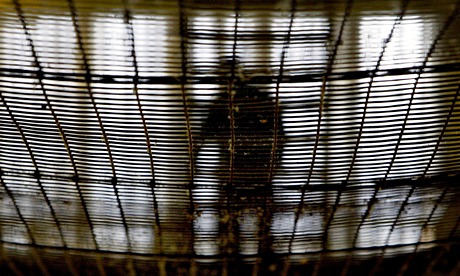The
justice secretary had a setback over whole-life tariffs, but he is set
on his evidence-free approach to prisons and probation

Under Chris Grayling's
stewardship, Pentonville prison has been pilloried by the chief
inspector of prisons. Photograph: Ian Waldie/Getty Images
The justice secretary's favourite target is Strasbourg. He hates the human rights court's intellectual rigour, its humanity and above all its reasonableness. He can also rely on his Daily Mail gang to pitch in with the odd punch. His latest fight over whole-life tariffs has been thwarted by neat finessing on the part of the court of appeal. This is not a cause for celebration. There will be future skirmishes which will be relished in the runup to the general election next year. Any sort of Europe-bashing equals votes.
Other victims of bullying have not fared as well. The probation service had a good kicking long before Grayling came on the scene. The National Offender Management Service, designed to bring prisons and probation closer together for the benefit of prisoners and communities, fell foul of reorganisational chaos.
Grayling then turned a good kicking into a thorough pummelling. In Tuesday's BBC Radio 4 File on 4 programme, Danny Shaw exposed the secretary of state's attitude to the small matter of evidence: he either doesn't see it or fails to recognise it.
Grayling sees the project at HMP Peterborough – run by Sodexo Justice Services, it is the first purpose-built prison to house men and women together in the UK – as a blueprint for the future. The rest of the world sees it as a dodgy experiment. Probation officers are leaving in their droves.
They will be replaced by inexperienced "operatives" of community rehabilitation companies on low wages and zero-hours contracts, acting as scapegoats for the future offending of "clients". Grayling is confident that there are people out in the charitable sector who know more than experienced probation officers with social work degrees. Of course there are some good people out there, but they will not fill the gap left by probation or the extra workload of the 50,000 short-term prisoners brought into the new contracts.
On Tuesday iHMP Pentonville was pilloried by the chief inspector of prisons, Nick Hardwick. That followed criticism of Oakwood, Thameside, Feltham, Brixton – the list goes on. The belief that these issues can be solved by prisoners having fewer privileges, wearing uniforms and not smoking is foolhardy at best. The logic seems to be that if prisons such as Pentonville have no future, we can build Titan jails across the country; "efficient" mass incarceration is just around the corner. And it will be needed, as the prison population continues to increase against the backdrop of politicians vying to out-tough each other on crime. Sadly none of these parliamentarians will be around to pick up the pieces; reshuffles and ambition will see to that.
Grandiose schemes based on dogma rather than logic envelop the criminal justice system. Existing laws are "interpreted" rather than obeyed. New laws are passed on everything from smoking in cars with children to being a "nuisance". It is all designed to make us feel warm and comfortable, and reassure us that something is being done.
There is a lot that actually could be done but stays in the criminal justice long grass. We could reduce the numbers of women in prison, treat them more humanely and save millions by implementing the Corston report recommendations. We could divert the mentally ill away from prison by following the Bradley report. We could stop locking up those with health problems, by adopting better drug laws. A truly independent report into the deaths of young people we incarcerate is essential. We might also want to learn some lessons form the abuse scandal that is Medomsley detention centre. But such actions don't win votes – or line the pockets of the private sector
Source
